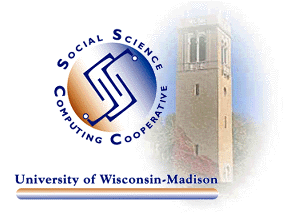
SSCC's Spring Training Schedule
Linux to Replace UNIX in 2004
Tip on Attachments and SquirrelMail
Tip on Updating Folder List in Eudora
SSCC's Spring training schedule is now available on SSCC's training web pages. Our list is a little shorter than usual because Russell Dimond, who teaches many of our classes, is out on medical leave. We still have plenty of offerings though including two new classes, one on setting up SpamAssasin to filter out your SPAM and one on spatial data analysis using GeoDa. The old reliables like "Intro to SAS", "Intro to UNIX", and "Creating a Web Page" are still there as well. Remember that all SSCC training sessions require preregistration. Register early before sessions fill!
SSCC introduced its first Linux computers in the fall of 2001 with the hope that they would prove to be a robust and reliable computing environment which we could use to replace our Tru64 UNIX computers. We have not been disappointed. Retiring our remaining Tru64 computers (HAL, NORMAN, ELAINE, and MARIAH) provides several advantages: the hardware and maintenance are much cheaper, it simplifies system management, and it provides opportunities for better Linux/Windows integration. Using Capital Equipment Exercise funds, we are purchasing the needed equipment to complete the transition to Linux by Fall Semester 2004. At that time, we will have a new file server which accesses user data on a new kind of storage device called a Storage Area Network (SAN); two interactive Linux computers, KITE and a new HAL; and an expanded Condor flock. The only software we currently have on Tru64 computers that is not available for Linux is HLM. This should only be a minor inconvenience because we have HLM installed on Windows Terminal Server. The good thing for you, besides having sate-of-the-art computing equipment, is that there's really nothing new you have to learn. The differences between UNIX and Linux are very subtle.
We'll be informing you about the timing of upcoming changes as equipment arrives and gets set up. NORMAN will be the last Tru64 computer retired because the SPSS license for Linux is expensive and so we want to put off its purchase as long as possible. The only significant down time will be when we move everyone's data (UNIX and Windows) to the SAN. We won't know how much time that will entail until the SAN arrives and we have a chance to run tests.
Many of us use SquirrelMail to read our email when we are away form home or the office, as we can access it from any web browser, anywhere in the world. This means that the computer we are using often belongs to someone else, and may be in a public location like an Internet café, or may belong to a friend or colleague elsewhere. On these occasions, it is very important to note the file location when you download, save, or edit an attachment to an email message.
When you get an attachment in your email, Squirrel offers you 2 choices - Download and View. View will show you the file, in your web browser, if it knows how to. If not, that option may not appear. If you plan to work on the attachment, be sure you choose Download. When you click on Download, a dialog box will open, with options to Open and Save. If you choose Open, be aware that the attachment will be downloaded to a temporary location on the computer's hard drive, which you may or may not have permission to access. You will be able to open the attachment, and may even be able to work with it. However, it will not be saved in a location that is convenient for you, or will be accessible to you from another computer. The default for storage is in a temporary directory, which is normally cleaned out when hard drive space is needed or as part of routine housekeeping.
If you want to work with the attached file, be sure you choose Save,
and be sure you save the file in a location that you can find again, that you
can access, and that will meet your needs. For example, if you need to take
the file with you, choose a removable drive such as a floppy disk for the Save
location. This will give you full access to the downloaded file, and will help
you keep track of it and make sure it's in a location that is secure and convenient
for you.
Sometimes the list of folders Eudora displays is missing some folders. This usually happens as new mailboxes are added and existing ones are changed or removed. When updating your folder list in Eudora to fix this problem, update the list twice before accepting the results. There is a bug in Eudora 5.2 and higher, that when updating the folder list it doesn't actually update the list until the request has been made twice.
Go to previous editions of
SSCC News.
Go to the SSCC Home Page.
© 2004 University of Wisconsin Social Science Computing Cooperative